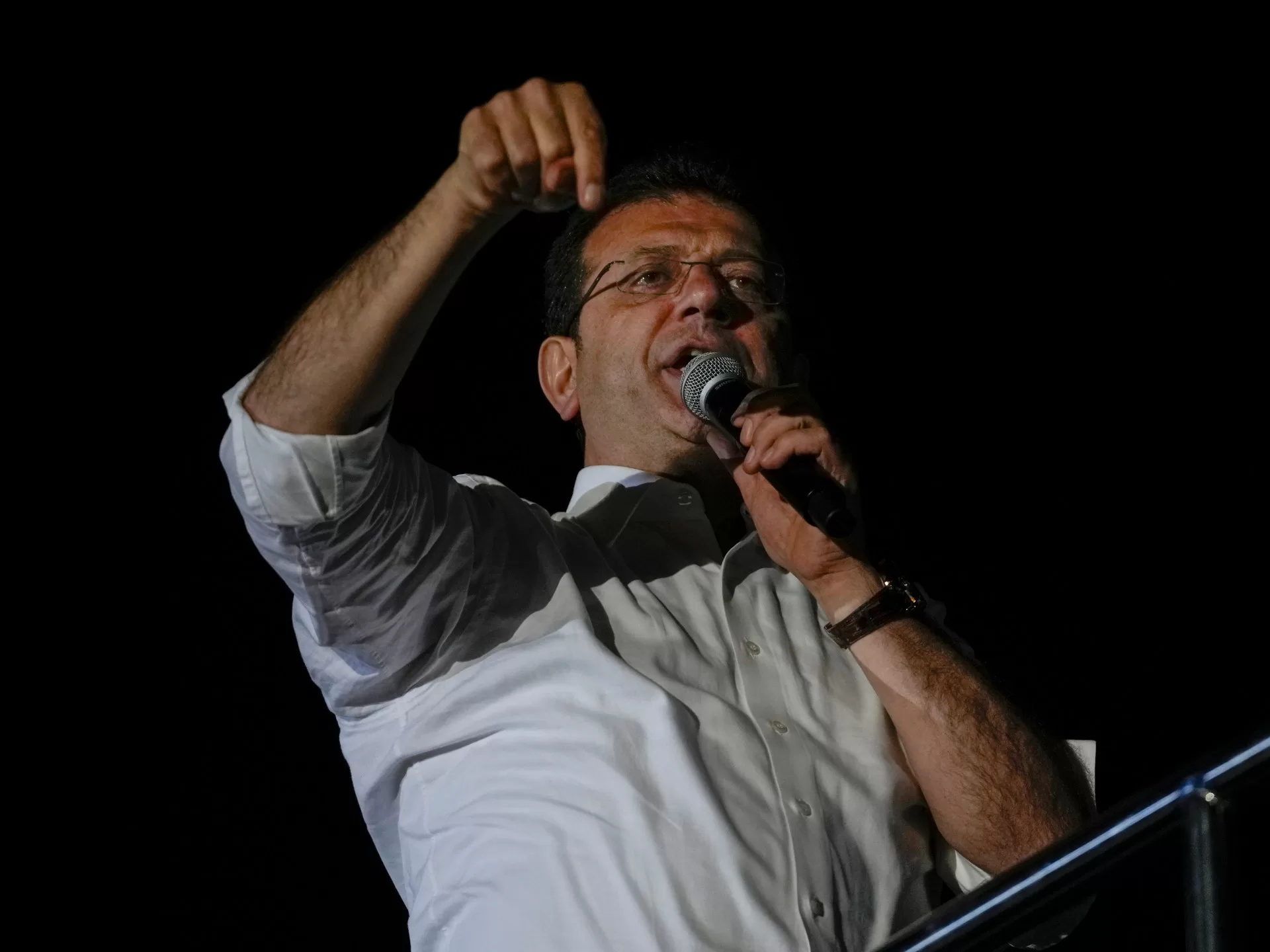In the final count after Sunday’s voting, the CHP won 37.8 percent of the ballots, followed by the AK Party with just under 35.5 percent, according to the Daily Sabah newspaper.
Istanbul’s CHP mayor, Ekrem Imamoglu, held the city, defeating AK Party candidate and former Environment and Urbanisation Minister Murat Kurum with just more than 51 percent of the vote. Erdogan, 70, was born and raised in Istanbul and served as its mayor in the 1990s, so the defeat was seen as a personal blow.
Who is Ekrem Imamoglu?
Imamoglu, 53, was elected mayor of Istanbul – Turkey’s economic hub and largest city with 16 million people – in 2019, ending 25 years of rule by the AK Party and its conservative predecessors.
Imamoglu’s career mirrors Erdogan’s: Both began their political careers in Istanbul in the 1990s and had them obstructed by legal issues.
Imamoglu is from the secularist CHP, joining in 2008 and becoming mayor of Istanbul’s Beylikduzu district 10 years ago.
He studied business administration at Istanbul University, graduating in 1994, the year Erdogan became mayor, before going into his family’s construction business.
Erdogan entered politics with the Islamist Welfare Party and in 2001 cofounded the AK Party, on whose ticket he became prime minister at the end of 2002.
In 2022, Imamoglu was sentenced to two years and seven months in prison and banned from politics on charges of insulting Turkey’s Supreme Election Council. He has appealed the case, but the appeals court has yet to rule.
The charges stem from Imamoglu’s first mayoral win. The AK Party complained of “irregularities”, which forced a rerun of the election. Imamoglu, who won a second time, described the cancellation of the first round as “foolishness”.
The mayor denied insulting electoral council members with the comment, saying he was responding to Interior Minister Suleyman Soylu, who called Imamoglu “a fool” and accused him of criticising Turkey.
Imamoglu was seen as a strong potential challenger against Erdogan in the 2023 presidential race, but he did not run, and Erdogan won against CHP rival Kemal Kilicdaroglu, winning 52 percent of the vote.
Where has CHP declared wins?
The CHP’s candidates won in 35 of Turkey’s 81 provinces, including Antalya, Denizli and Izmir.
Besides Imamoglu declaring victory in Istanbul, CHP Mayor Mansur Yavas also held on to the capital, Ankara, defeating his challenger, veteran politician Turgut Altinok, with just more than 60 percent of the vote.
Are the results a surprise?
In the May 2023 presidential election, the opposition strove to unseat Erdogan and his AK Party. The CHP had hoped to have a chance against Erdogan after domestic economic turmoil and the fallout from the devastating February 2023 earthquakes in southern Turkey.
The efforts failed as Erdogan won another five-year presidential term and an AK Party-led coalition won a majority in parliament, dealing a blow to the CHP and the opposition.
After last year’s elections, the nationalist IYI, or Good, Party split from the CHP, and a Kurdish-focused party, now renamed the DEM Party, fielded its own candidates against the CHP in the local elections, which it did not do in 2019.
Opinion polls before Sunday’s voting had indicated that the AK Party would make a strong showing, but that was not the case.
How did the opposition hold on to its advantage?
There has been rising discontent in Turkey due to its economic decline, which resulted in nearly 70 percent inflation and a rising cost of living.
Analysts speculated that the AK Party did worse than predicted due to the economy and, in Istanbul, Imamoglu’s appeal beyond the CHP’s secular base.
“The economy is probably the number one issue in these elections,” said Vehbi Baysan, assistant professor at Ibn Haldun University in Istanbul.
What was the reaction?
Opposition supporters lit torches and waved flags in Istanbul, celebrating the wins.
A voter from Istanbul told Al Jazeera’s Sinem Koseoglu: “We love our mayor very much. He’s fair and treats everyone equally. He prevented corruption. He spends Istanbul’s money on Istanbul.”
But supporters of the AK candidate were unhappy, saying Kurum had stood by them.
How did Erdogan react?
Erdogan delivered a speech from the balcony of the presidential palace, saying his party had suffered “a loss of altitude” across Turkey and the people had delivered a “message”.
“Unfortunately, nine months after our victory in the May 28 elections, we could not get the result we wanted in the local election test,” Erdogan added. “We will correct our mistakes and redress our shortcomings.”
He promised to press ahead with an economic programme introduced last year aiming to combat inflation.
What will happen next?
Some observers predicted these local elections will give Imamoglu the support he needs to follow in Erdogan’s footsteps, rising from Istanbul’s mayor to Turkey’s president in the 2028 race.
Erdogan has indicated that he will not run for a fourth term in 2028, nor is he eligible to run, according to the current constitution.
However, Ahmet Kasim Han, political science professor at Istanbul’s Beykoz University, said before the local elections: “If Murad Kurum loses and Ekrem Imamoglu wins, that is going to force Erdogan to probably run himself in 2028, rather than going through the hassle of picking an alternative.”
Erdogan can run for another term if parliament calls for snap elections or if a change in the constitution is passed, Mehmet Celik, editorial coordinator at Daily Sabah, explained in an episode of Al Jazeera’s Inside Story on Sunday.
Han postulated that hypothetical snap elections would take place “very close to 2028”.
